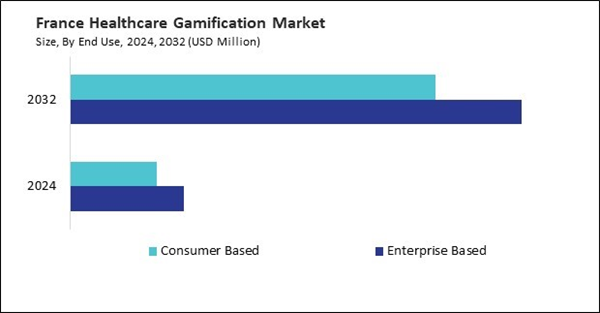The Germany market dominated the Europe Healthcare Gamification Market by country in 2024, and is expected to continue to be a dominant market till 2032; thereby, achieving a market value of $906.1 million by 2032. The UK market is exhibiting a CAGR of 17.5% during 2025-2032. Additionally, the France market is expected to experience a CAGR of 19.4% during 2025-2032.
The applications of gamification in healthcare are extensive and diverse, addressing a broad spectrum of challenges faced by patients, healthcare providers, and caregivers. One of the primary applications is chronic disease management, where patients with conditions such as diabetes, hypertension, and cardiovascular diseases are encouraged to adhere to their medication regimens and lifestyle changes through interactive apps that reward compliance and track progress. For example, gamified platforms may provide daily challenges, visual progress charts, and social sharing features that foster a sense of community and accountability.
In the realm of mental health, gamification is used to support therapies for anxiety, depression, and stress management. Mobile apps incorporating gamified cognitive behavioral therapy (CBT) techniques engage users in mood tracking, relaxation exercises, and resilience training, helping them develop coping mechanisms in a non-intimidating and motivating environment. Similarly, rehabilitation programs for stroke, physical injuries, or post-surgery recovery increasingly utilize gamified exercises to make physical therapy more enjoyable and consistent.
The United Kingdom has been at the forefront of integrating gamification into healthcare, leveraging its robust digital infrastructure and a strong emphasis on preventive care. The National Health Service (NHS) has supported various digital health initiatives, fostering an environment conducive to the adoption of gamified solutions. Key influencing factors include the UK's commitment to digital transformation in healthcare, as evidenced by the NHS Long Term Plan, which emphasizes the use of technology to improve patient outcomes. The country's high smartphone penetration and widespread internet access have also facilitated the adoption of mobile health applications incorporating gamification elements.
Germany's healthcare gamification market is experiencing significant growth, driven by the country's strong emphasis on technological innovation and preventive healthcare. The Digital Healthcare Act (DVG) has facilitated the integration of digital health applications into standard care, reimbursed by statutory health insurance. Key influencing factors include government support for digital health initiatives and a population increasingly open to using technology for health management. Germany's aging population and the prevalence of chronic diseases have also spurred demand for engaging, self-management tools. Current trends show a surge in the development of serious games aimed at rehabilitation and therapy, as well as fitness apps that incorporate gamified elements to motivate users.
France is progressively embracing healthcare gamification, supported by national initiatives aimed at digitizing healthcare services. The French government's Ma Santé 2022 strategy emphasizes the modernization of the healthcare system through digital tools. Key influencing factors include government investment in digital health infrastructure and a growing public interest in health and wellness technologies. France's emphasis on preventive care and patient education aligns well with the objectives of gamified health applications. Market trends reveal an increasing use of gamification in areas such as smoking cessation, weight management, and chronic disease monitoring. Mobile applications and online platforms are being developed to engage patients in their health journeys through interactive and rewarding experiences. Hence, Europe's growing adoption of gamification in healthcare is being propelled by supportive policies, technological advancements, and a collective shift toward proactive and patient-centered care.
List of Key Companies Profiled
- Fitbit, Inc. (Google LLC)
- Microsoft Corporation
- Medtronic PLC
- Sephora SA (LVMH Moët Hennessy Louis Vuitton)
- Brainlab AG
- BI WORLDWIDE
- Omada Health, Inc.
- Cognifit, Inc.
- Mango Health, Inc. (TrialCard, Incorporated)
- Reflexion Health
Market Report Segmentation
By End Use
- Enterprise Based
- Consumer Based
By Type
- Exercise Game
- Serious Game
- Casual Game
By Application
- Education/Training of Physicians
- Education/Training of Hospital Staff
- Pharmaceutical Sales Training
- Commercial Gains for Patients
- Insurance companies using Gamification
- Gamification in Clinical Trials
By Country
- Germany
- UK
- France
- Russia
- Spain
- Italy
- Rest of Europe
Table of Contents
Companies Mentioned
- Fitbit, Inc. (Google LLC)
- Microsoft Corporation
- Medtronic PLC
- Sephora SA (LVMH Moët Hennessy Louis Vuitton)
- Brainlab AG
- BI WORLDWIDE
- Omada Health, Inc.
- Cognifit, Inc.
- Mango Health, Inc. (TrialCard, Incorporated)
- Reflexion Health









